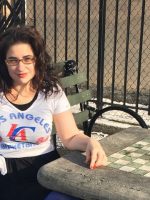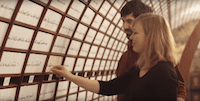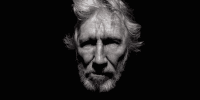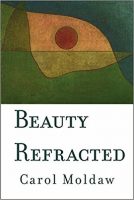March 22, 2018
Edited by David Sanders
Specimen Days
1639—Thomas Carew, English poet/diplomat (The Rapture), dies.
1857—Arnold Sauwen, Flemish poet (Along the Meuse), is born.
1905—Phyllis McGinley, poet, is born.
1941—Billy Collins, American poet, is born.
1991—Paul Engle, American poet and writer (Worm Earth, American Song), dies at 82.

It seems only yesterday I used to believe
there was nothing under my skin but light.
If you cut me I could shine.
But now when I fall upon the sidewalks of life,
I skin my knees. I bleed.
—from “On Turning Ten” by Billy Collins
“It seems only yesterday I used to believe / there was nothing under my skin but light.” – Billy Collins
World Poetry
Krakow Hosts Syrian Poet Kholoud Charaf as Refugee

The City of Krakow has begun hosting Syrian poet and art critic Kholoud Charaf as a part of the International Cities of Refuge Network (ICORN). Charaf was originally trained as a medical technician, a capacity in which she worked with female prisoners in As-Suwayda in southwestern Syria. In 2013, she witnessed abuse of prisoners and received a death threat from a police officer if she revealed it. Since then, she has turned to poetry and art criticism, and has also worked as an English teacher, but in Syria she was still unable to express herself freely. Further endangering her is her status as a divorcee, which is seen there as bringing shame to the family and which heightens her risk of kidnapping by militant groups.
Sheikh Mohammed bin Zayed visits Yemeni poet at Burjeel Hospital
Sheikh Mohammed bin Zayed, Crown Prince of Abu Dhabi and Deputy Supreme Commander of the Armed Forces, has visited the Yemeni poet Fadl Mahmoud Saleh, who is receiving medical treatment at Burjeel Hospital in Abu Dhabi. Sheikh Mohammed reassured Mr Saleh on his health condition and wished him a quick recovery.
Massive Volcano Described in Apocalyptic Poem Ushered in Christianity for Iceland's Vikings
Memories of the largest lava flood in the history of Iceland, recorded in a medieval poem, were used to drive the island's conversion to Christianity, suggests the study. A team of scientists and historians, led by Cambridge University researchers, has used information contained within ice cores and tree rings to accurately date the massive eruption, which took place soon after the island was first settled. Having dated the eruption, the researchers found that Iceland's most celebrated medieval poem, which describes the end of the pagan gods and the coming of a new, singular god, describes the eruption and uses memories of it to stimulate the Christianisation of Iceland.
The City of Krakow has begun hosting Syrian poet and art critic Kholoud Charaf as a part of the International Cities of Refuge Network.
Recent Reviews
Fusing Language and Landscape in Poetry
Lynn Melnick’s poetry — particularly its themes of sexual abuse, rape culture, violence, sex work, and drug use — pushes the boundary between public and private.
by Laura Wetherington

One of the first rooms at the van Gogh Museum in Amsterdam houses a collection of his self-portraits and a timeline of his life. During van Gogh’s first two years in Paris, he painted 28 self-portraits. A wall text states that they “were not meant to show what he was like, but were exercises in colour, brush-work, and facial expression.” A parallel distinction holds true for poetry — although even everyday language mistakes the author for the art, as in the question, “Have you read Lynn Melnick?” While no one would expect van Gogh’s eyebrows to be blue in reality, it’s easy to forget that the writer and the poem’s speaker are not the same. The speaker is a creation of language, what poet Mary Jo Bang has described as “a construct — sometimes a type, sometimes a ventriloquist’s doll dressed in clothes hand-sewn by the poet.”
Desolation Row
by Colm Tóibín
In his late teens, Federico García Lorca’s main interest was music and song. He was steeped not only in the Andalusian folk tradition but also in the European art song. He loved the work of Schubert and Beethoven. Lorca’s arrangements for piano and voice of Andalusian folk songs, inspired by Manuel de Falla’s arrangement in 1914 of seven other Spanish songs, combine in the subtlety of their harmonies an attention to the European art tradition and to local expression.
An Invisible World: Tomas Transtromer’s The Half- Finished Heaven: Selected Poems (Expanded Edition)
by Aaron Belz
Between 2001, when The Half-Finished Heaven: Selected Poems was first published, and now, Tomas Tranströmer won the Nobel Prize and died. It seems reasonable, then, to rerelease the volume with additional prefatory matter and fourteen additional poems. According to its Graywolf page, those fourteen poems mean the expanded edition of The Half-Finished Heaven is now the only complete, definitive record of Robert Bly’s Tranströmer translations. As it was Bly who imported Tranströmer to America—and Tranströmer has become a giant here—this fact is of some note.
While no one would expect van Gogh’s eyebrows to be blue in reality, it’s easy to forget that the writer and the poem’s speaker are not the same.
Broadsides
Where My Dreaming and My Loving Live: Poetry & the Body, Part I: To Reimagine Healing
by Ricardo Hernandez
“The poem,” Rafael Campo writes in his essay “AIDS and the Poetry of Healing,” “is a physical process, is bodily exercise.” It is “perhaps […] an idealization, or a dream of the physical — the imagined healthy form. Yet it does not renounce illness; rather, it reinterprets it as the beginning point for healing.” Although Campo’s ideas in that essay reflect a dynamic he felt between formal poetry and his experience treating patients suffering from AIDS, I’d venture to say that they can be extended to encompass all poems, formal or otherwise, and to illnesses that wrack not only the singular, subjective body, but its larger, ephemeral cognate, the body politic — and it was under this belief that I compiled this list.
Reader Discretion Advised
On profanity and the sublime in poetry.
by Claire Luchette
At first, fuck is only phonemes. To the uninitiated, the word is no more than the sum of its linguistic parts: a fricative, a schwa, a velar stop. Fuck’s real power lies in its transgressiveness. It’s a dirty word, but a versatile one: noun, verb, adjective, adverb, a sui generis part of speech altogether. Fuck is profane. In some circles, it’s also sacrilege, almost on par with the smut that gets a person eternally damned. And so fuck becomes fun. A provocation, a taboo.
The Poet as Architect: How Poems Are Designed and Constructed to Convey the Sense of Space
by Sumana Roy
How does a poem make us move our neck and our eyes? Trying to explain to students how to create – produce; generate – space in poems, I often remind them of one of the first English poems that we encounter.
Twinkle twinkle little star
How I wonder what you are
Up above the world so high
Like a diamond in the sky.
Most of us were taught to act out this nursery rhyme. Our heads craned upwards, to the ceiling, the first metonym for sky in our urban lives.
“The poem,” Rafael Campo writes in his essay “AIDS and the Poetry of Healing,” “is a physical process, is bodily exercise.”
Drafts & Fragments
Unique Bank of Love in Slovakia

One building in Banská Štiavnica harbours a safe for love inside, the Love Epicentre. Its main attraction is the unique Archive of Love, created from the 2,900 verses of the Marína poem. The poem Marína was written in 1846 by Andrej Sládkovič to his love Marína, a love that wasn’t destined to be. The poem is 2,900 verses long and it is officially recognized as the longest love poem in the world, Dobré Noviny wrote.
Helen Mirren Reads Stephen Colbert a Poem Specifically to Make Him Cry. Will You?
by Halle Kiefer
As the proliferation of television platforms creates more and more niche programming, surely there’s room for a show that’s just Oscar winners reading poems until you start to cry. Apropos of a conversation about what makes them weep, Stephen Colbert had Helen Mirren read the end of Alfred, Lord Tennyson’s “Ulysses.” It’s not full-on sob, but if the poem doesn’t get you, watching Stephen Colbert fight back tears probably will.
Massive 24-foot-wide Chinese Poem Scroll Painting Soars to $72,500 at Bruneau & Co.'s March 3rd Auction

A gigantic 19th century Chinese archaic poem scroll painting – 24 feet wide by 29 inches tall – sailed past its estimate of $800-$1,200 to command $72,500 at Bruneau & Co. Auctioneers’ March 3rd Antiques, Fine Art & Asian Arts auction, held online and at the firm’s Cranston gallery. The buyer was an in-house Asian bidder acting as a broker for overseas buyers. About 18 feet of the scroll’s 24-foot image area comprised the painted landscape. Other features included several chops and collection seals along the borders of bold calligraphy. Some creasing and foxing on the paper didn’t deter bidders, who were evidently able to decipher the name of the artist, whereas Bruneau & Co. declined to weigh in. That accounted for the modest estimate.
One building in Banská Štiavnica harbours a safe for love inside, the Love Epicentre.
Poetry In the News
Roger Waters Recites Palestinian Poem in Video for New Song: Watch
“Supremacy” is in response to Trump’s decision to recognize Jerusalem as the capital of Israel

Roger Waters has shared a new video called “Supremacy.” Watch it via Rolling Stone below. The stark video is a response to Trump’s December decision to formally recognize Jerusalem as the capital of Israel, upending decades of American foreign policy with plans to move the U.S. embassy from Tel Aviv to the newly proclaimed capital. “Supremacy” features Waters reciting “the Penultimate speech of the ‘Red Indian’ to the white man,” a poem by Palestinian poet Mahmoud Darwish over music by Palestinian group Trio Joubran.
Graywolf Poet Layli Long Soldier Wins Critics Circle Award

On a night when winners in all six competitive categories were women, Layli Long Soldier won in poetry for “Whereas” and Frances FitzGerald’s “The Evangelicals: The Struggle to Shape America” was honored for nonfiction. Long Soldier, a citizen of the Oglala Lakota Nation, is published by Minneapolis-based Graywolf Press. Her collection “Whereas,” confronting the language of the U.S. government in its treaties and apologies to Native American peoples, won the $75,000 PEN/Jean Stein Book Award last month.
In his new music video Roger Waters recites “the Penultimate speech of the ‘Red Indian’ to the white man,” a poem by Mahmoud Darwish.
New Books
Beauty Refracted by Carol Moldaw
[Paperback] Four Way, 82 pp., $15.95

In iridescent, intimate lines, Carol Moldaw’s Beauty Refracted is a stunning tapestry of the ways we are marked by time. From the “unstaunchable grief” of losing a parent to the experience of raising a child through adolescence, Moldaw peels back the veil of the everyday to discover the metaphysical passions hidden underneath.
The Wall by Ilan Stavans
[Paperback] University of Pittsburgh Press, 120 pp., $15.95
The Wall is a poetic exploration—across time, space, and language, real as well as metaphorical—of the U.S.-Mexican wall dividing the two civilizations, of similar walls (Jerusalem, China, Berlin, Warsaw, etc.) in history, and of the act of separating people by ideology, class, race, and other subterfuges. It is an indictment of hateful political rhetoric. In the spirit of Virgil’s Aeneid and Spoon River Anthology by Edgar Lee Master, it gives voice in symphonic fashion to an assortment of participants (immigrants, border patrol, soldiers, activists, presidents, people dead and alive) involved in the debate on walls. It brings in elements of literature and pop culture, fashion and cuisine. Poetry becomes a tool to explore raw human emotions in all its extremes.
House of McQueen by Valerie Wallace
[Paperback] Four Way, 66 pp., $15.95

Winner of the Four Way Books Intro Prize as selected by Vievee Francis, Valerie Wallace’s House of McQueen is a fascinating, glittering debut by an assured new voice. Inhabiting the life and work of Alexander McQueen, Wallace builds a fantastical world using both original language and excerpts drawn from interviews, supermodels, Shakespeare, Poe, and more. At turns fierce and vulnerable, precise and decadent, here is a collection that leaps from runway to fairytale to street with wild, brilliant grace.
The Golden Coin by Alan Feldman
[Paperback] University of Wisconsin Press, 104 pp., $14.95
What is good fortune? The Golden Coin asks―and answers―this question in poems about youth, conflict, travel, family love, and the joys and fears of getting old. Aboard his sailboat, Feldman draws lessons from the sea about time and history. His gaze tempered not by nostalgia or longing but by satisfaction and happiness, he finds wry joy in the Havana airport's sniffer dog napping near the impounded luggage. In acknowledging the inevitability of change, he reports from the battle zones of an essentially lucky life, with only as much sadness and terror as ordinary life inevitably requires.
Aileron by Geraldine Connolly
[Paperback] Terrapin Books, 102 pp., $16.00

Open this book at random and find a trove of thrilling images and unexpected metaphors: tiny bells jingling like sins, "a cool lake of indifference," "an impossible wheel of hunger." Read this book beginning to end and discover a dark trajectory, the work required to integrate one's family of origin with a wider consciousness and responsibility. As have those in Geraldine Connolly's previous books, these poems fly. But equipped with the acute sensitivity of an aileron, they fly higher and more daringly–exposing for us our own "beating heart, its thump and clamor." This is the work of a gifted poet at the height of her powers. –Natasha Sajé
In iridescent, intimate lines, Carol Moldaw’s Beauty Refracted is a stunning tapestry of the ways we are marked by time.
Correspondences
Interview with 2018 NBCC Poetry Award Finalist James Longenbach
by M.L. Thompson

There are moments when insufferable existential questions transmute into the mundane. Feelings we have never had answers for become best explained in waiting and solitary. In James Longenbach’s most recent poetry collection Earthling (W.W. Norton), he marks the existential and human inclination to wonder with music, and ruminations on aloneness. This collection explores the body’s relationship with its own consciousness. Longenbach builds worlds which later crumble under new imaginative pursuits. He thinks about his mother’s passing and his own mortality. Earthling is told by an endless cacophony aware of its limits—realizing “you’re ruled by your body, condemned / Each day to fill it so that tomorrow / You may fill it again”? James Longenbach is the author of four earlier collections of poetry, and many works of literary criticism. I had the honor to speak with him about this National Book Critics Circle nominated work Earthling.
Jazzercise Is a Language: In Conversation with Gabriel Ojeda-Sague
by Alli Warren
My first encounter with Gabriel Ojeda-Sague was through his debut book Oil and Candle (Timeless, Infinite Light, 2016). On a warm Sunday in Oakland, I lay flat on my back in the grass at Lake Merritt, absorbed in the book’s textural and astute treatments of ritual and race. I met Gabe for the first time a year later at a reading in Philadelphia, where I was glad to learn that he was just as smart, generous, and engaged in person as his writing was on the page. Gabe and I decided to do this interview as a way to celebrate his new book, Jazzercise is a Language (The Operating System, 2018), and to delve deeper into some of the books themes. The book is a long poem about Jazzercise, camp, racial politics, body politics, and feminine strength. As Gabe writes in the book, “the secret is in the derriere, the burning secret, the bushel of flowers” — in this interview I took the opportunity to ask about some of those secrets.
The Homeland Left Behind, Captured in a Poem
by Jennifer Hijazi
Poet Shauna Barbosa’s first collection carries the same swing and spirit of its namesake, jazz pianist Horace Silver’s 1966 album “The Cape Verdean Blues.” Barbosa’s poems are sharp and lyrical, her phrases rich with interjections of Cape Verdean Creole and the music she admires so much. “Being able to create a sound is just one of the most remarkable things to me,” Barbosa said, an effect she aspires to in her own work.
Poet Claudia Rankine Speaks about Confronting Racism Head On in her Writing
by Susan Gonzalez

While being honored March 8 by the International Festival of Arts & Ideas with its eighth Visionary Leadership Award, poet Claudia Rankine described an encounter that she said is not all that uncommon for her. A white man approached to her to tell her how much he appreciated her award-winning 2014 poetry collection “Citizen: An American Lyric,” which describes everyday acts of racism experienced by black Americans. He then asked her: “What can I do for you?” “Nothing,” answered Rankine, the Frederick Iseman Professor of Poetry at Yale. The man angrily ended the conversation.
James Longenbach builds worlds which later crumble under new imaginative pursuits.
Envoi: Editor’s Notes
Lessons from the Past: Billy Collins
"The first line is the DNA of the poem; the rest of the poem is constructed out of that first line. A lot of it has to do with tone because tone is the key signature for the poem. The basis of trust for a reader used to be meter and end-rhyme. Now it’s tone that establishes the poet’s authority. The first few lines keep giving birth to more and more lines. Like most poets, I don’t know where I’m going. The pen is an instrument of discovery rather than just a recording implement. If you write a letter of resignation or something with an agenda, you’re simply using a pen to record what you have thought out. In a poem, the pen is more like a flashlight, a Geiger counter, or one of those metal detectors that people walk around beaches with. You’re trying to discover something that you don’t know exists, maybe something of value."
“The first line is the DNA of the poem; the rest of the poem is constructed out of that first line.” – Billy Collins